Local funding for affordable housing will increase modestly under the approved fiscal year (FY) 2018 budget, adding to the District’s substantial commitment to housing in recent years. Yet most of DC’s housing investments in FY 2018 will not help the city’s lowest-income residents.
Total local funding for affordable housing[i] will be $214 million, an 8 percent increase from last year, adjusted for inflation (Figure 1; Table 1).
While these resources are significant, the budget makes only modest progress in expanding assistance to DC’s extremely low-income families, who face the most severe affordable housing challenges. The budget funds new rental assistance for some apartments developed through the Housing Production Trust Fund, but not enough to meet the Trust Fund’s statutory requirement to direct 40 percent of its resources to extremely low-income residents. Only a small part of DC’s substantial investment in the Trust Fund will reach the city’s lowest-income residents. The budget adds some new rental assistance, both for formerly homeless residents, and families on the DC Housing Authority waiting list. This new assistance is meaningful, yet will help only a small fraction of the 26,000 extremely low-income households who face severe housing hardship.
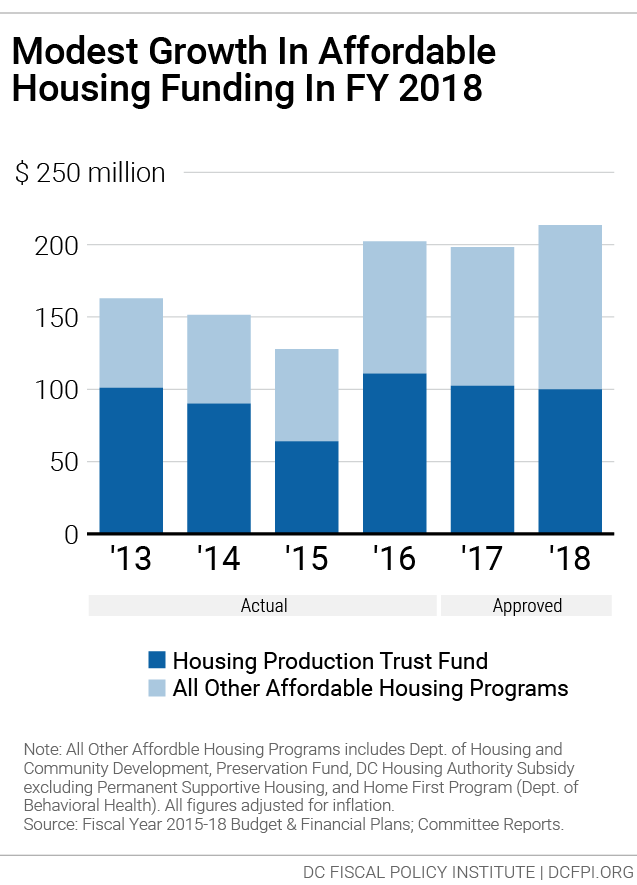

Funding for the Housing Production Trust Fund Will Be Maintained in FY 2018
The FY 2018 budget provides $100 million for the Housing Production Trust Fund (Figure 2). The Trust Fund, DC’s main affordable housing tool, provides low- and no-interest loans to housing developers to help build or renovate affordable housing.
This will be the third year in a row that $100 million will be invested in the Housing Production Trust Fund—one of the highest funding levels in the Trust Fund’s history, and enough to produce or preserve approximately 1,000 affordable units.
The FY 2018 budget supports the Trust Fund with $52 million in dedicated taxes and a $48 million supplement. Each year, 15 percent of deed recordation and transfer tax collections are dedicated to the Trust Fund. The one-time supplemental funding is not built into future budgets, meaning that additional funding will need to be identified again a year from now to maintain the $100 million funding level.
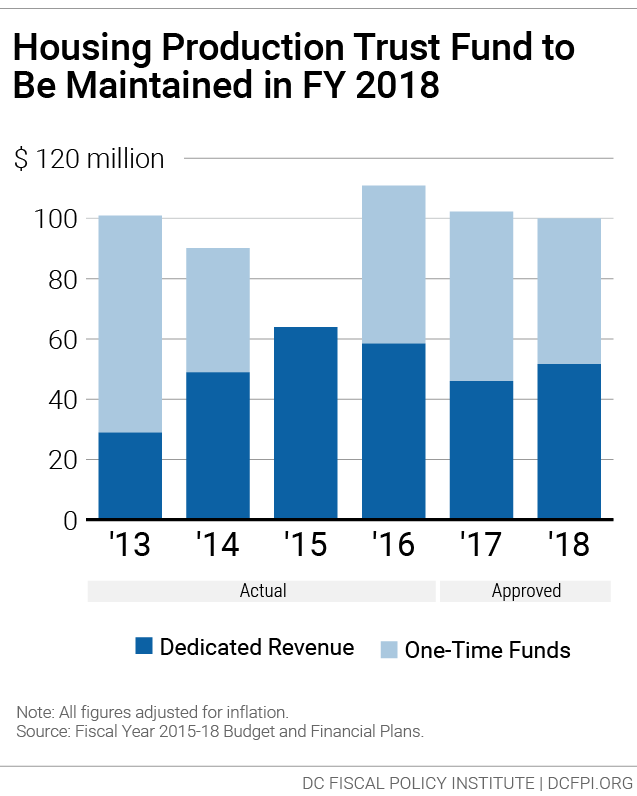
The budget also provides funds to strengthen oversight of projects that received assistance from the Housing Production Trust Fund. In a recent study, the DC Auditor identified the lack of enough staff to monitor projects as a key factor in lapses in compliance among a subset of Housing Production Trust Fund projects. The budget helps address this issue by adding five full-time employees to the division of the Department of Housing and Community Development (DHCD) responsible for overseeing Trust Fund and other projects.
In addition, per the Budget Support Act, DHCD will be permitted to use a larger share of the Housing Production Trust Fund’s budget for administrative expenses: 15 percent, up from 10 percent. While it is important for DHCD to have the necessary resources to oversee the Trust Fund, the District should closely monitor the share of the Trust Fund that is used for administrative expenses in the future to ensure that resources are used efficiently and appropriately. Compared to other jurisdictions (both cities and states) with housing trust funds, dedicating 15 percent of the fund to administration falls on the high end.
New Fund Will Help Preserve Existing Affordable Housing
The FY 2018 budget adds an additional tool to the District’s affordable housing toolbox: a fund dedicated to preserving existing low-cost housing.
The budget adds $10 million to establish a housing preservation fund, which is expected to leverage $30 million in private-sector investment. The fund is an important step towards saving more of DC’s disappearing affordable housing. It will provide financing to help acquire and rehabilitate affordable housing projects, such as privately owned buildings with federal subsidies that are about to expire. Key parameters, such as which income levels the fund will target or how projects will be selected, have yet to be determined.
The budget also dedicates three staff positions within the Department of Housing and Community Development to a new “preservation unit.” The preservation unit will be responsible for identifying low-cost housing at risk of being lost and deploying resources—including the preservation fund—to keep the housing affordable. Both the preservation fund and preservation unit were key recommendation of the housing preservation strike force convened by Mayor Bowser in 2015.
Some New Rental Assistance, But an Insufficient Amount to Ensure Other Housing Resources Are Well-Targeted
The FY 2018 budget provides some new funds for rental assistance through the Local Rent Supplement Program (LRSP). The budget provides new funds for Targeted Affordable Housing vouchers to help formerly homeless households afford rent, and provides operating subsidies for affordable units built through the Housing Production Trust Fund. The budget also adds new support for the component of LRSP that takes families off the DC Housing Authority waiting list (Figure 3).
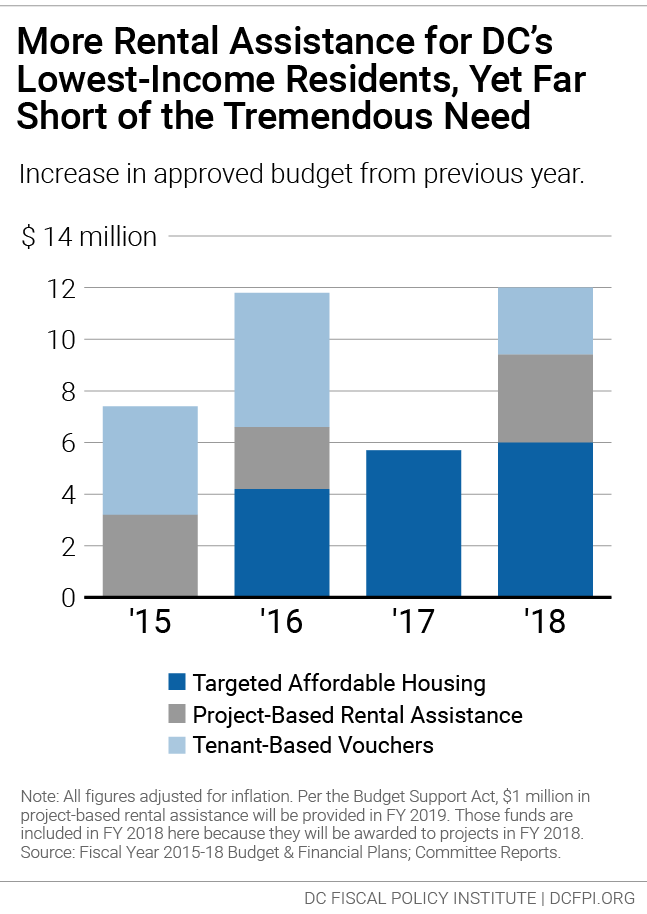
- Targeted Affordable Housing: The budget adds $6 million to assist formerly homeless residents: 186 families and 184 individuals. Targeted affordable housing helps residents who had been in Permanent Supportive Housing, and no longer need the included intensive services but still need help affording housing. It also helps residents whose temporary Rapid Rehousing assistance is ending who still need help paying rent.
- Tenant-Based LRSP: The budget includes $2.6 million in new funds to provide vouchers to take approximately 175 households off the DC Housing Authority waiting list and help them pay the rent at private market apartments.
- Project-Based Rental Assistance: The budget adds $3.4 million for rental assistance linked to affordable buildings. Of those funds, $1.4 million will be available to existing affordable buildings to allow units to serve families at the lowest income levels. The remaining $2 million in project-based LRSP subsidies will go to future affordable housing projects built through the Housing Production Trust Fund. Per the Budget Support Act, $1 million of the $2 million is set aside in the financial plan for FY 2019, but will be available to be awarded to projects in FY 2018.
Budgeting some project-based LRSP for future years—rather than in the year construction funds are awarded to a given project—makes sense because subsidy payments can only begin once projects have been built and occupied, which often is several years after the award.
Because this is a new approach to funding project-based LRSP, however, policymakers should keep a close eye on the outcome of the Consolidated RFP (the competitive process by which Housing Production Trust Fund and other housing subsidies are awarded) to see that project-based LRSP subsidies budgeted for future years are successfully awarded to projects in FY 2018.
The new project-based LRSP subsidies will support some 142 units affordable to extremely low-income residents. Yet at this level, Housing Production Trust Fund will not meet the statutory requirement that 40 percent of its resources support housing affordable to extremely low-income residents.
Dim Outlook for Housing Affordable to Extremely Low-Income Residents
Unless the Local Rent Supplement Program is scaled up beyond the level provided in the FY 2018 budget, the District’s other affordable housing tools will continue to fail to reach extremely low-income residents in a meaningful way, even though they are the most likely to face severe housing hardship.
The District’s recent affordable housing efforts, while substantial, are ill-matched to need. Since 2010, DC has produced more new affordable rental units for households with incomes between 50 percent and 80 percent of Area Median Income (between $55,000 and $88,000 for a family of four) than for families with incomes below 30 percent of AMI ($33,000 for a family of four), even though three-fourths of the families with severe housing problems are at this extremely low income level (Figure 4).
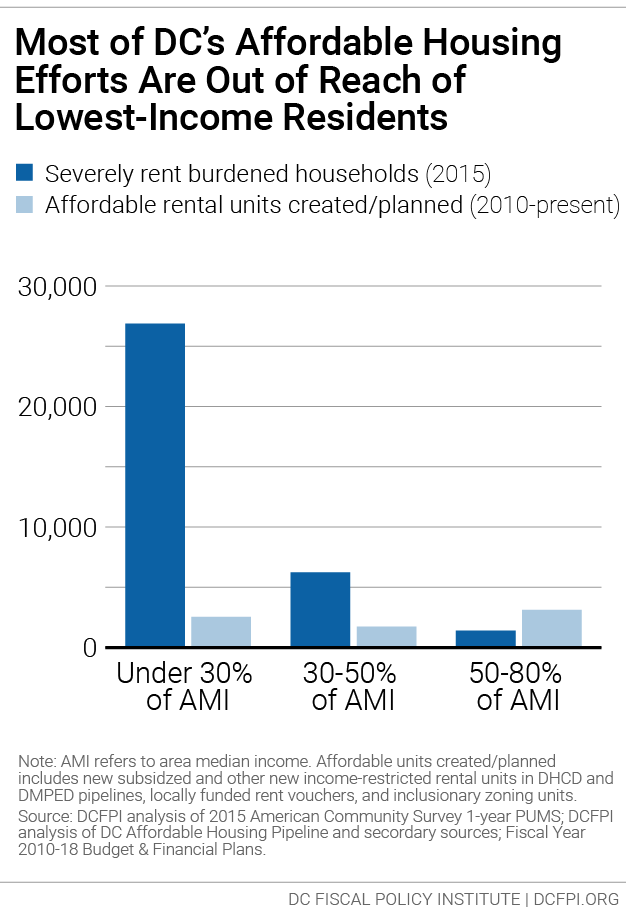
The primary roadblock in the District’s ability to meet the housing needs of extremely low-income residents is the lack of an adequate amount of operating assistance and vouchers through LRSP—a reality that goes largely un-remedied in the approved FY 2018 budget.
Importantly, unless funding for project-based LRSP is scaled up in future budgets, the Housing Production Trust Fund will fail by a wide margin to meet the statutory requirement that 40 percent of its resources serve extremely low-income residents. Nearly all of Trust Fund-assisted units require project-based LRSP to be made affordable to the lowest-income residents. While 32 percent of the Trust Fund’s resources will reach extremely low-income households in FY 2018 (a larger proportion than in the previous year), the share will fall to 10 percent in FY 2019 and FY 2020, according to DCFPI projections.[ii] Indeed, in the 5-year period between 2015 and 2020, the District will have met the Trust Fund’s extremely low-income targeting requirement only once (Figure 5).
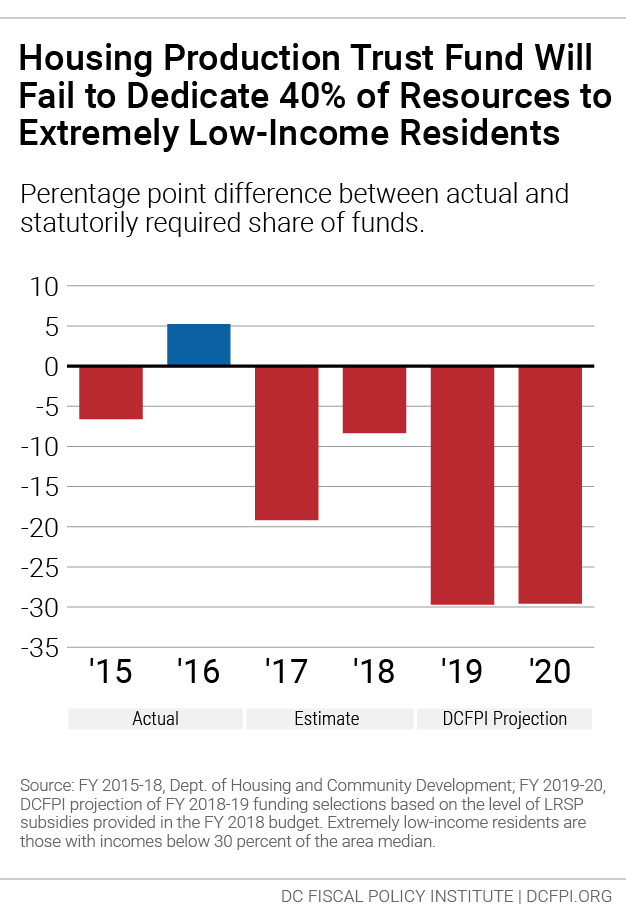
Figure 5.
Increase in Assistance for First-Time Homebuyers in FY 2018
The budget expands programs that help low- and moderate-income residents become first-time homebuyers. The Home Purchase Assistance Program (HPAP) provides interest-free loans for down-payment and closing costs. Funding for HPAP was substantially expanded in FY 2017, as the maximum amount of assistance available per household was raised to keep up with the District’s high and rising home prices. The FY 2018 budget adds $1 million to HPAP, from federal funds. In addition, the budget provides $1.7 million in local funds to the Employer Assisted Housing Program, which provides down-payment assistance to DC government employees. Total funding for home purchase assistance programs—federal and local funds combined—will be $17.1 million in FY 2018 (Figure 6).
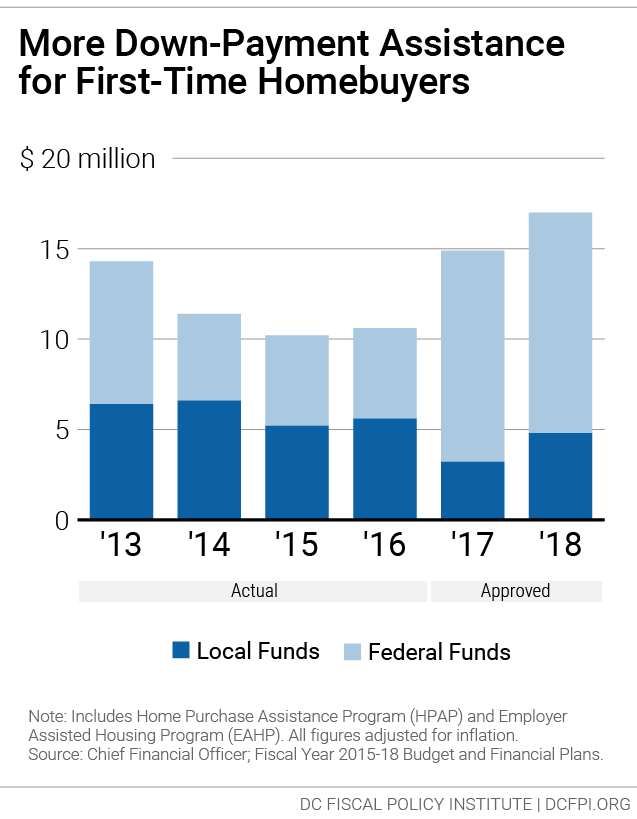
Permanent Supportive Housing for Chronically Homeless Residents Will Increase in FY 2018
Permanent Supportive Housing places chronically homeless individuals and families into affordable housing with built-in case management services.
The FY 2018 budget includes $8.7 million to expand Permanent Supportive Housing to approximately 154 families and 274 individuals as part of an effort to end chronic homelessness. These changes are covered in more detail in DCFPI’s summary of the FY 2018 homeless services budget, as part of the DCFPI Budget Toolkit.
Housing Program for Residents with Mental Illness Will Be Unchanged
The Home First program at the Department of Behavioral Health is a rent subsidy program designed to help individuals with mental illness to bridge into long-term stable housing.[iii] The FY 2018 budget for the Home First program is $9.3 million. In nominal dollars, funding for the Home First program has been maintained at the same level since FY 2015—meaning that adjusting for inflation, the program’s budget has shrunk 5 percent.
[i] DCFPI’s Budget Toolkit on the Mayor’s proposed FY 2018 budget did not include the Home First program (Department of Behavioral Health) due to data availability issues. That information is now available, and so is included in this Toolkit.
This Budget Toolkit does not include Permanent Supportive Housing in the total amount of funding for affordable housing, due to data consistency issues; available information for FY 2016 and forward is not comparable to FY 2015 and earlier. This toolkit will be updated if updated information on Permanent Supportive Housing funding becomes available.
[ii] DCFPI projection based on analysis of various sources, including: Department of Housing and Community Development pipeline database, DHCD RFP award announcements/press releases, LRSP contracts as described in DC Housing Authority oversight documents and contract approval resolutions submitted to the DC Council, and secondary sources. For full documentation of this projection along with assumptions used, contact Claire Zippel, czippel@dcfpi.org
[iii] DCFPI’s Budget Toolkit on the Mayor’s proposed budget did not include the Home First program (Department of Behavioral Health) due to data availability issues. That information is now available, and so is included in this Toolkit.
